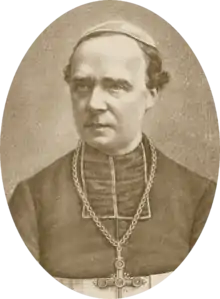Georg von Kopp
Georg von Kopp (25 July 1837 – 4 March 1914) was a German Cardinal of the Roman Catholic Church who served as Bishop of Fulda (1881–87) and Prince-Bishop of Breslau (1887–1914). He was known for his anti-Polish views and pursued the Germanization of Polish Catholics in his dioceses.
His Eminence Georg von Kopp | |
|---|---|
| Bishop of Breslau | |
 | |
| Diocese | Breslau |
| See | Breslau |
| Appointed | 9 August 1887 |
| Term ended | 4 March 1914 |
| Predecessor | Robert Herzog |
| Successor | Adolf Bertram |
| Other post(s) | Cardinal-Priest of Sant'Agnese fuori le mura |
| Orders | |
| Ordination | 28 August 1862 |
| Consecration | 27 December 1881 by Daniel Wilhelm Sommerwerk |
| Created cardinal | 16 January 1893 by Pope Leo XIII |
| Rank | Cardinal Priest |
| Personal details | |
| Born | 25 July 1837 |
| Died | 4 March 1914 (aged 76) Opava, Austrian Silesia |
| Denomination | Roman Catholic |
| Previous post(s) | Bishop of Fulda (1881-1887) |
| Coat of arms |  |
Biography
Kopp was born in Duderstadt in the Kingdom of Hanover. He was the son of a weaver and attended the gymnasium at Hildesheim. In 1856 he became a telegraph operator in the employ of the Hanoverian government. From 1858 to 1861, he studied theology and in 1862 entered the priesthood. He rose rapidly in his profession and in 1872 was made vicar-general at Hildesheim and three years later bishop of Fulda. He worked to bring about a better understanding between the German government and the papal curia. After his election to the House of Lords he obtained a mitigation of the anti-Catholic provisions which characterized the May laws.
In 1887, with the approval of the Prussian government, the Pope appointed him prince-bishop of Breslau (Wroclaw), and in 1893 he was made cardinal. As prince bishop he pursued Germanization and censured those priests whom he suspected as resisting these measures, opposed used of Polish in classes and communion, and tried secretly to discourage Polish faithful from making pilgrimages to Krakow.[1] He was made Cardinal by Pope Leo XIII in 1893. He took part in the 1903 conclave which elected Pope Pius X. He was honored to be listed first among the recipients of that pope’s encyclical Singulari Quadam promulgated on 24 September 1912.[2] Kopp died in Opava in Austrian Silesia.
Notes
- German Nationalism and Religious Conflict: Culture, Ideology, Politics, 1870-1914 Helmut Walser Smith July 2014, page 189-190
- Pope Pius X . Singulari Quadam, 24 September 1912, Libreria Editrice Vaticana
References
- This article incorporates text from a publication now in the public domain: Rines, George Edwin, ed. (1920). . Encyclopedia Americana.
- Salvador Miranda: The Cardinals of the Holy Roman Church